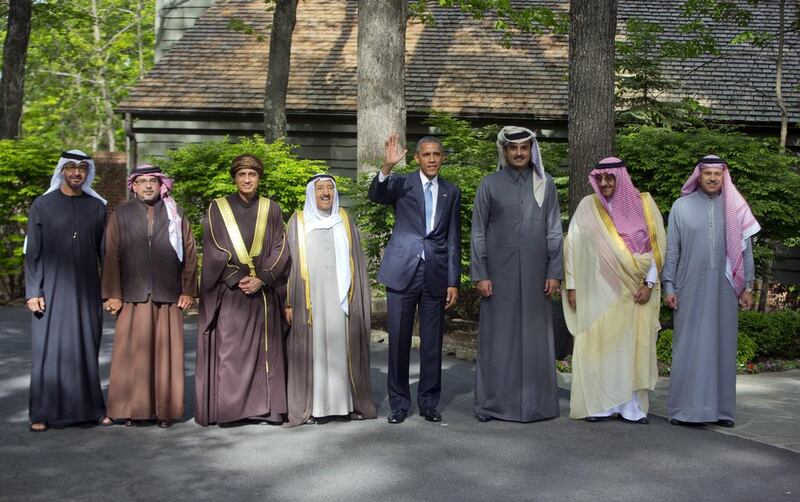The GCC was created amid great flux in the Middle East with the emergence of a number of potentially existential threats, from Iran’s Islamic Revolution, to the Soviet invasion of Afghanistan which presaged the end of the Cold War, and the devastating Iran-Iraq war that threatened to disrupt all-important oil exports.
On May 25, 1981 in Abu Dhabi, the six Arab Gulf states, encouraged by Washington, signed a charter to form the new bloc and forge greater cooperation on economic, political and security issues.
Economic integration has been perhaps its greatest success, while the countries formed a united front against Saddam Hussein in 1991, and a mutual defence treaty was signed in 2000, which facilitated the deployment of the Peninsula Defence Shield to back Bahrain’s monarch in 2011 -- all key examples of cooperation that justified the complexities and headaches of creating a multilateral institution in such a volatile region.
But core shared interests have not obscured the deep differences between the six countries that have led to years-long diplomatic spats, accusations of sponsoring coup attempts, and even one case of military clashes and casualties.
Many moments of tension centred on Qatar, and disagreements over territory. Qatar and Bahrain severed diplomatic ties for 11 years, until 1997, over competing claims to the Hawar Islands. Qatari and Saudi forces skirmished in 1992, leaving three people dead. Even relations between current close allies Saudi Arabia and UAE soured over territorial claims.
All the smaller countries have been wary of Saudi imposing its will on them or losing any sovereignty over foreign policy. Differing approaches to Iran and regional conflicts have historically prevented greater military integration, which Washington has tried to foster for decades.
“A particular member state finding itself at odds with the majority view within the GCC, as both Doha and Muscat have recently, is an expected feature of Arab Gulf politics,” a report titled The Outlook for Arab Gulf Cooperation produced by the US Rand Corporation stated last year. “The six states tend to fall out, get back together again, and pair off.”
The cycle of internal conflict and resolution, the report said, waxed when external threats were at a low point, and internal issues overtook concerns, and waned when shared security was threatened by outside forces. But now, the internal crisis with Qatar is happening at precisely a time when regional threats are high, and Riyadh and Abu Dhabi are working more closely than ever to create a new model of stability in the region after the turmoil of the Arab Spring.
The current crisis pitting the most powerful axis within the bloc -- Riyadh and Abu Dhabi -- against the third regional GCC power, Doha, has shattered the norms that have usually governed internecine disputes, including economic sanctions and the expulsion of Qatari citizens.
UAE officials have said that along with increased and permanent economic measures, that a “divorce” between Qatar and the other five GCC states is a serious possibility, whether through Qatar's expulsion or suspension from membership.
Qatari officials says this is prohibited by the terms of the GCC Charter. “They cannot take such a decision because it must be by consensus,” Sheikh Mohammed bin Abdulrahman Al Thani, Qatar’s foreign minister, said on Wednesday.
Article 13 of the charter does state that GCC resolutions “in substantive matters” must be passed by unanimous vote. But in times of tension, the letter of the GCC charter is usually ignored, as has been the case in the current crisis, where there has been no recourse to the official GCC dispute mechanism. Now, as in the past, Kuwait or some other neutral member, engages in mediation outside of the terms of the charter.
Qatar could be banished in similar fashion, said Matteo Legrenzi, a scholar of the Gulf at Ca’ Foscari University of Venice and the author of Gulf Security: Legacies of the Past, Prospects for the Future.
“Once you do have the political will to put distance between one country and other specific countries, or get a specific country back into the fold, the written norms and rules count for less,” Mr Legrenzi said. “Ultimately, rulers rule, so if the degree of hostility...is such that, say, the Saudi government, the UAE government, really want to freeze out Qatar indefinitely they are in a position to do so.”
Whether Kuwait and Oman, which have both remained neutral, agree to join them is less clear. Even if the bloc does not formally dissolve, in the wake of such deep divisions, the practical effect could be similar.
“The GCC is finished as an effective body, it will remain just as the Arab League remains, but it’s finished,” said Mishaal Al Gergawi, founder and managing director of the Delma Institute in Abu Dhabi.
“We don’t live in a world where we expect the Iranians to invade our countries or successfully depose any regimes, we don’t live in a world where there is major, traditional conventional war happening,” he added. “And we’re not all on the same side anymore.”





